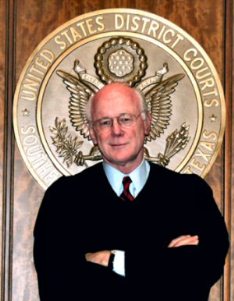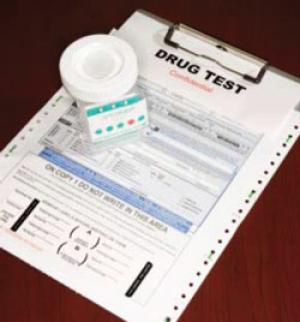The Senate has passed a bill banning new synthetic drugs. It's already passed the House, and the president is expected to sign it into law shortly.
The police can -- and do -- track your cell phone without a warrant, and they are increasingly resorting to it in the wake of the January Supreme Court decision barring warrantless GPS tracking.
A former El Paso city council member who wants to legalize marijuana has knocked off drug warrior Rep. Silvestre Reyes in the Texas Democratic Party primary.
After seven years in an Indonesian prison over nine pounds of marijuana, there are signs that Schapelle Corby could be free by this fall.
ProCon.org is a set of in-depth web sites presenting information and views from on current issues, several with relevance to drug policy. This week the Chronicle concludes our several week series of info items from ProCon.org -- this one from felonvoting.procon.org.
It's been a pretty quiet week on the medical marijuana front. Heck, it looks like even the DEA took a break -- no raids to report.
Barry Obama and his buddies in the Choom Gang spent their high school and undergraduate years in a haze of pot smoke, a new biography reveals. Drug reformers are chiding him now for his current positions on the issue.
Marijuana decriminalization is just a pair of floor votes away from passage in the Rhode Island General Assembly after companion bills were approved by respective judiciary committees Tuesday.
If you want welfare benefits in Tennessee, you will have to submit to drug screening that could include a drug test under a bill just signed into law.
Don't give joints to snitches you're having an affair with -- that's the lesson one California cop learned last week. There are more crooked cops for us this week, too.
The Senate has passed House Resolution 1254, the Synthetic Drug Control Act of 2011, which would federally criminalize the possession, distribution, and manufacture of synthetic cannabinoids ("fake marijuana") and synthetic stimulants ("bath salts"). The measure has already passed the House, and President Obama is expected to quickly sign it into law.
The synthetic
cannabinoids are marketed as "herbal incense" and sold under brand names such as K2 and Spice, while the synthetic stimulants are marketed as "bath salts" and sold under a variety of names, including Ivory Wave and Vanilla Sky. Poison control centers and emergency rooms around the country have reported a sharp increase in synthetic drug incidents in the past two years, with Spice users reporting adverse effects similar to those sometimes reported with marijuana, while bath salts users have suffered more serious adverse effects, including hallucinations, psychotic breaks, and death.
Fake pot or bath salts or both are already banned in a number of states, and more states are considering criminalizing them. Both types of drugs have already been subject to emergency bans by the DEA while its legislatively mandated process for evaluating new drugs proceeds.
A widely publicized incident over the weekend in which a man chewed off parts of another man's face before being shot and killed by police has heightened concerns about the new synthetics, generating headlines like
"Miami cannibal zombie-like attack linked to powerful 'bath salts' drug," but at this point, such claims are pure speculation. Police in the case have also posited "a new form of LSD" and "cocaine psychosis" to explain the attack, but any real information will have to await a toxicologist's report.
Sen. Rand Paul (R-KY) had single-handedly blocked passage of the bill for months by placing a senatorial hold on it. Paul objected to harsh mandatory minimum sentences in the bill, as well as to further broadening of the federal war on drugs.
But bill supporters, led by Sen. Charles
Schumer (D-NY), resorted to a parliamentary maneuver to get it passed. They quietly attached it to an FDA regulatory bill, which the Senate passed last Wednesday.

Sen. Rand Paul got mandatory minimums removed
Still, Sen. Paul was able to insert language into the bill specifying that the Controlled Substance Act's mandatory minimum 20-year sentence for anyone supplying a drug that causes severe bodily harm or death to a user does not apply to the newly banned synthetics. That's because in order to get the FDA bill approved by Memorial Day, Sen. Rob Portman (R-OH), who actually sponsored the amendment adding the synthetics to the FDA bill, had to win unanimous consent for his amendment. Paul agreed not to object after Portman inserted the language about the mandatory minimums.
The bill still contains
draconian sentencing provisions, including sentences of up to 20 years for a first sale or manufacturing offense and up to 30 years for a subsequent offense.
The bill's sponsors said after the vote that its passage would strike a strong blow against the new synthetics, but industry advocates and the Congressional Budget Office (
CBO) disagree.
"Let this be a warning to those who make a profit manufacturing and selling killer chemical components to our teens and children: the jig is up,"
Schumer said in a
statement. "This bill closes loopholes that have allowed manufacturers to circumvent local and state bans and ensures that you cannot simply cross state lines to find these deadly synthetic drugs."
"These new designer drugs can kill, and if we don't take action, they are going to become more and more prevalent and put more and more people at risk," Sen. Amy
Klobuchar (D-MN), another sponsor of the bill said in a
statement. "Today's action is good news for this critical legislation to give law enforcement the tools they need to crack down on synthetic drugs before they put more lives in danger, and I will continue to work to ensure these provisions are signed into law."
But the
Retail Compliance Association (RCA), which represents smoke shop and convenience store operators and which opposed the bill, pointed out that the bill only bans five chemical families and only names 15 synthetic
cannabinoids. Many of those compounds are already off the market, the RCA said, adding that the bill does not include hundreds of additional compounds unrelated to the chemical families banned under it.
"This bill will be touted as banning what law enforcement has deemed 'fake pot,' but it does no such thing; it actually only bans a few of the potential ingredients of these products, by no means the products themselves," said RCA spokesman Dan Francis. "The bill's range of enforcement may well be limited to the specifically named compounds because labs cannot test for chemical families, nor can the police or retailers. The products are tested by many different levels of this industry, and no lab I have spoken with has a test to determine the chemical family," Francis added.
The
CBO, for its part, published a
cost analysis of the bill in November that found its impact would be minimal.
"Based on information from industry and law enforcement experts,
CBO expects that, by the date of the legislation's enactment, most vendors will have largely replaced the banned substances with new products because many states have already passed legislation banning some or all of the compounds listed in the bill and because the DEA has already issued emergency rules temporarily banning five
cannabimimetic agents and three synthetic stimulants," the analysis found.
Still, Congress can pat itself on the back for "doing something" about the new synthetic drugs -- whether or not it actually does anything good.
back to top
special to Drug War Chronicle by investigative journalist Clarence Walker, [email protected]
In the wake of the US Supreme Court's January decision in United States v. Jones, in which the high court forbade the warrantless use of GPS tracking devices to surveil people's movements, law enforcement and the Obama administration are scrambling -- not to find ways to comply with the spirit of the ruling, but to find ways around it.
Police in many states have switched tactics by obtaining mobile data to zero in on someone's prior movement and by tracking them through their cell phones, usually without a warrant. Whenever a cell phone is used, it "pings" an electronic signal to the nearest cell phone tower, allowing law enforcement to use the cell phone to find or track people. And cell phones containing GPS devices, which are increasingly common, "ping" constantly.
In April, the American Civil Liberties Union (ACLU) released an
extensive study of state, federal, and local law enforcement's surveillance practices that illustrate how police track citizens through their cell phones. The findings were staggering. Warrantless cell phone tracking "has become a powerful and widely used surveillance tool for police officials, with hundreds of departments, large and small, often using it aggressively with little or no court oversight," the report found.
After poring over 5,500 pages of records in responses from over 200 local law enforcement agencies, the ACLU researchers reported that "only a tiny minority" -- 10 agencies total -- had obtained a warrant before tracking someone through his or her cell phone.
"What we have learned is disturbing," said ACLU staff attorney Catherine Crump, who helped file public information requests with some 385 law enforcement agencies. "The government should have to get a warrant before tracking a cell phone. Instead, what we found was that the cops track people with no supervision, or in some cases, mostly drug cases, the cop will go to court and only show that it would be relevant to an investigation, which is a lower standard."
The ACLU is calling for law enforcement agencies to desist from using cell phone tracking without a warrant, and is calling on state and federal lawmakers to pass legislation requiring a warrant before police use location tracking in non-emergency situations.
A bill to address the problem is pending in Congress.
Senate Bill 1212, the
Geolocation Privacy and Surveillance (GPS) Act, is sponsored in the Senate by Senators Ron
Wyden (D-OR) and Mark Kirk (R-IL). Companion legislation in the House,
House Resolution 2168, is sponsored by Reps. Jason
Chaffetz (R-UT), Peter Welch (D-VT) and Jim
Sensenbrenner (R-WI.). The bills would require law enforcement agents to obtain a warrant in order to access location information.
Another Senate effort, Judiciary Committee chair Senator Patrick Leahy's (D-VT) Electronic Communications Privacy Act Amendments Act,
Senate Bill 2011, offers a partial repair of the problem. It includes a warrant requirement for real-time tracking, but not for historical location information.
The Obama administration disagrees that any action is needed. At a
State of the Mobile Net conference held in May, Justice Department Deputy Assistant Attorney Jason Weinstein argued, "[t]he need for such warrantless cell phone tracking is important so it won't cripple the government and law enforcement."
The administration's lawyers insist that when a person turns on a cell phone, the information from the phone is transmitted through a third-party, such as the wireless carrier, and the user thus has no "expectation of privacy."
Warrantless cell phone tracking "should be illegal," said Washington, DC, appellate attorney Stephan
Leckar, who successfully represented DC nightclub owner Antoine Jones in the case cited above.
In that case, the Supreme Court reversed Jones' conviction and sentence of life without parole in a cocaine trafficking case after they found substantial evidence that the FBI placed a GPS device on Jones vehicle for 28 days without a search warrant. When police monitored Jones vehicle without a warrant, the court said, "This violated his Fourth Amendment right against unreasonable search and seizure."
According to
Leckar, the "third-party" doctrine is a means for law enforcement to get around the Fourth Amendment. "As the law reads," he said, the 'third-party' doctrine doesn't violate the Fourth Amendment. To change this, people will have to petition Congress to change that doctrine."

Judge Lynn Hughes
While privacy advocates like the ACLU's Crump argue that cell phone users should get the same protections against warrantless tracking as people subjected to GPS devices being surreptitiously placed on their vehicles, the Justice Department disagrees.
"There is no trespass or physical intrusion on a citizen's cell phone when the government obtains historical cell-site records from a provider," Justice Department attorneys argued in a
brief in an appeals court case in February, adding that cell phone data are not as precise as GPS tracking data.
Most, but not all, recent state and federal court decisions in major drug cases have upheld the right of police to either track cell phones or search them for evidence in an investigation. In March, the US
7th Circuit Court of Appeals upheld a warrantless search of a cell phone by Indiana police, a phone belonging to a meth dealer identified as Abel Flores Lopez. Flores was given ten years in federal prison. His co-defendant Alberto Santana Cabrera received the toughest punishment. Santana got 75 years after failing to assist the government with valuable information on other drug dealers.
But federal judicial opinion isn't unanimous. Last year, in a blistering one-page ruling, US District Court Judge Lynn Hughes of the Southern District of Texas in Houston declared "that the law allowing the government to obtain cell phone records without a warrant is unconstitutional."
In that case, federal prosecutors had subpoenaed
MetroPCS and T-Mobile to hand over sixty days of cell phone location data belonging to drug suspects. "The records would show the date, time, called number, and location of the telephone when the call was made," Hughes noted.
As the law now stands, cell phone customers who value their privacy are at the mercy of law enforcement and their wireless service providers. And the wireless service providers are all too happy to work with law enforcement voluntarily, and turn a tidy profit doing it.
Our favorite carriers, including AT&T, Verizon, T-Mobile and Sprint, are in on the action by selling information to police about a person's whereabouts, including the sale of private text messages and cell tower data, which pinpoint the location where someone is using a cell, the
New York Times reported in March. Some companies are marketing surveillance fees to law enforcement to spy on targets even though wireless carriers declare that they don't sell their customers' information to police.
The Times found that T-Mobile charges law enforcement $150 per-hour for cell phone data that shows the approximate location of the tower that a cell phone "pings" off of when the user makes a call. It found that Alltel provides a faxed listing of an electronic "Tower Dump" for specific times and dates. The listing is "no charge," but the company charges a flat rate of $500 for those searches.
Verizon Wireless, on the other hand, charges $30-$60 for 15 minutes' worth of tower data, while AT&T charges $75 hourly (a minimum of two to four hours per tower) for a Cell Tower Dump or Cell Site Usage Report. Cell Site Usage also includes subscriber information for the location, date and time when a phone was used.
The Times also found that Sprint once billed the Raleigh, North Carolina, Police Department at a "reduced rate" of $50 for an historic tower search and added $30 more for a search of "L-Site GPS pings," while the ACLU reported that Sprint had billed the Phoenix Police Department $460 for the GPS "pings" over a two-day period in 2009.
"The bottom line is that our mobile phone companies should be working for us, their customers, not the police, says Nicole
Ozer, an ACLU staff attorney.
Not only are the wireless providers profiting from your privacy by working with the police, they are lobbying to be able to continue to do so. Even as the debate rages over warrantless cell phone tracking, cell carriers are geared up to oppose legislation that would force the companies to publicly report the number of times their employees provide cell phone location information to police and federal agents.

Sen. Al Franken
One important proposal is California
Senate Bill 1434, introduced by Sen. Mark Leno (D-San Francisco), which would prohibit carriers from revealing data to police without a warrant. Wireless providers are joining together to fight it.
"These reporting mandates would unduly prevent us from insuring the public's safety and saving lives," AT&T, Sprint, and T-Mobile said in a
joint statement.
The battle continues. Motivated by the ACLU research and news reports on the controversy surrounding warrantless cell phone tracking, US Senator Al Franken (D-Minnesota) recently convened a Senate Judiciary Committee hearing to gather support for the GPS Act. At the hearing, Franken unveiled a letter he had written to Attorney General Holder seeking information on Justice Department cell phone tracking activity, what the department's stance on the standard for requests for historical location data (cell sites, GPS data), and whether the department had changed its practices in the light of the Jones decision.
He is still awaiting a response from Justice.
On the legal front, with state and federal courts split in their decisions on whether warrantless phone tracking violates the Fourth Amendment, the tens of millions of Americans who use cell phones and smart phones will have to wait for the Supreme Court to be the final arbiter. In the meantime, they could just be tracking you -- warrant or not.
back to top
Former El Paso city councilman Beto O'Rourke has defeated US Rep. Silvestre Reyes in the battle for the Democratic Party nomination for the seat Reyes has held since 1996. According to election results from the Texas Secretary of State's office early Wednesday morning, O'Rourke had picked up 51.3% of the vote to Reyes' 41.3%, meaning O'Rourke also avoids the need for a run-off election.

Beto O'Rourke (betoforcongress.com)
is a vocal drug policy reformer who has specifically called for marijuana legalization, while Reyes, a former Border Patrol official, has built a career on tough on the border and tough on drugs politics.
O'Rourke garnered national attention in 2009, when he championed a council resolution calling for a national conversation on legalizing and regulating drugs as a possible solution to the drug cartel violence just over El Paso's border in Mexico. The mayor vetoed the unanimously-passed resolution and the council was set to override the veto until Congressman Reyes threatened that the city would lose federal funding if it insisted on pushing the legalization conversation. The override vote failed, but
O'Rourke has managed to use the issue as a launching pad for his campaign against what had been a heavily-favored incumbent.
O'Rourke has spoken eloquently of the violence in Mexico and its roots in drug prohibition, including at
Drug Policy Alliance conferences, and is the coauthor, along with fellow El Paso city council member Susie Byrd, of
Dealing Death and Drugs: The Big Business of Dope in the US and Mexico, which calls explicitly for marijuana legalization.
"
O'Rourke's victory demonstrates that support for drug policy reform, and even for legalizing marijuana, is no detriment to electoral success - in fact it was a key asset in his triumph," said Ethan
Nadelmann, executive director of Drug Policy Action, the Alliance's campaign and lobbying arm.. "Reyes' surprising defeat, meanwhile, shows that
kneejerk support for persisting with failed drug war tactics can hurt politicians at the ballot box."
Earlier this month, the Democratic primary for Attorney General in Oregon featured a similar dynamic. Ellen
Rosenblum won a surprising victory over favorite Dwight Holton, in a race in which medical marijuana became a major issue.
Rosenblum is supportive of patients' right to safe and legal access to medical marijuana, while her opponent, former Interim U.S. Attorney Dwight Holton, is sharply critical of the program. Although Holton was heavily favored early in the race, he was targeted for defeat by supporters of medical marijuana after actively trying to undermine responsible state regulation. With no Republican filing for the office,
Rosenblum is all but certain to be the state's next attorney general.
"
Beto O'Rourke's congressional victory in Texas, coming on the heels of Ellen
Roseblum's victory in Oregon's attorney general race, shows that drug policy reform is no longer a third rail in American politics," said Jill Harris, managing director of strategic initiatives for Drug Policy Action. "In both of those races, the candidates' views on marijuana reform were used against them in attacks by their opponents - and in both cases, the voters supported the pro-reform candidate. A majority of Americans now favor treating marijuana like alcohol, and strong majorities of both Democrats and Republicans say the federal government should not interfere with state medical marijuana laws. From blue states like Oregon to red states like Texas, it's a new day for the politics of drug policy reform."
Having won the Democratic primary, O'Rourke is well placed for a victory in November in this solidly Democratic district that has sent Reyes to Washington eight times. But now, it's a drug reformer El Paso is likely to send to Congress, not a drug warrior.
(This article was published by StoptheDrugWar.org's lobbying arm, the Drug Reform Coordination Network, which also shares the cost of maintaining this web site. DRCNet Foundation takes no positions on candidates for public office, in compliance with section 501(c)(3) of the Internal Revenue Code, and does not pay for reporting that could be interpreted or misinterpreted as doing so.)
back to top
Indonesian President Susilo Bambang Yudhoyono cut Australian Schapelle Corby's 20-year prison sentence for smuggling marijuana into the country by five years last Tuesday, meaning the former beauty school student will be eligible for parole this fall.

Schapelle Corby, November 2006 (Schapelle.net)
Corby's plight became something of a cause
célèbre -- there is even a
web site devoted to her release -- after she was arrested at an airport in Bali as she arrived on vacation in 2004. In her luggage was found nine pounds of marijuana. She always maintained her innocence, and the case strained relations between Australia and Indonesia.
Corby applied for a sentence reduction two years ago, with her attorney arguing that her mental health was slipping after years of confinement in the overcrowded
Kerobokan Penitentiary.
Australia welcomed the cut in sentence.
"The Australian government has consistently supported Ms. Corby's application for clemency on humanitarian grounds," Foreign Minister Bob Carr said in a statement.
The 34-year-old's release is not, however, a done deal. She must be approved for parole, and Australia must guarantee her good behavior upon release. Corby and her team are asking the Australian government for its support in the parole bid.
Despite some criticism from hard-liners, Indonesian Justice Minister Amir
Syamsuddin said Corby's conviction was "not related to heroin or other heavy drugs" and was not for major drug trafficking. "It was purely marijuana and the marijuana didn't weigh hundreds of kilograms," he said.
back to top
Did you know that the US is an exception in restricting voting rights of ex-felons after they complete their sentences? A 2003 study of 45 democracies (including those with supporting documentation found in constitutions, electoral laws or other documents) found just five countries with such restrictions, one applying them only rarely through judicial orders. Read about it in
International Comparison of Felon Voting Laws, on
http://felonvoting.procon.org, part of the
ProCon.org family.
This concludes Drug War Chronicle's ProCon.org Did You Know series. For more info, sign up for ProCon.org's email list or RSS feed, and click here for last week's Chronicle Did You Know segment. ProCon.org is a web site promoting critical thinking, education, and informed citizenship by presenting controversial issues in a straightforward, nonpartisan primarily pro-con format.
We will return to ProCon.org in the fall. Next month we visit Drug War Facts.
back to top
It's been a pretty quiet week on the medical marijuana front. Heck, it looks like even the DEA took a break -- no raids to report. Let's get to it:
National
On Memorial Day,
a veterans' group slammed the Obama administration for its stance on medical marijuana. Veterans for Medical Cannabis had petitioned the administration to look into the reliable new science showing that medical marijuana has benefits and asked the administration to change its policies to allow vets to use it for Post-Traumatic Stress Disorder. What they got instead was
a canned non-response from drug czar Gil
Kerlikowske.
Arizona
Last Friday,
the Department of Health Services held a hearing on requests to expand its fledgling medical marijuana program to allow use of the herb for a variety of conditions, including Post-Traumatic Stress Disorder. Besides PTSD and migraines, the requests for covered conditions include depression and general anxiety disorder. The law already permits medical marijuana use for such medical reasons as cancer, glaucoma, AIDS, chronic pain, muscle spasms and hepatitis C.
Also last Friday,
the application period for people seeking to open dispensaries ended. The Department of Health Services will issue only 126 dispensary permits statewide, but had received nearly 500 applications, along with a $5,000 fee, $4,000 of which is non-refundable. The department will review the applications and grant permits on August 7. If an application passes review and is the only application in its district, it will be granted a permit. In districts with multiple applications, those that survive the review process will enter a lottery to see who gets the permit.
California
Last Wednesday,
a San Diego medical marijuana prosecution ended in a mistrial after jurors deadlocked and the judge dismissed prosecutors' request to retry the case "in the interest of justice." The effort by San Diego District Attorney Bonnie
Dumanis to convict Therapeutic Healing operator Dexter Padilla was only the latest in her ongoing campaign against medical marijuana. In dismissing the prosecution request for a new trial, the judge accused the DA's office of being "disingenuous" in its arguments in the case.
Also last Wednesday,
the state Supreme Court denied review of a key medical marijuana case, handing a victory to patients and providers. Attorney General
Kamala Harris and law enforcement had asked the court to review
People v. Colvin, which upheld certain protections for patients and providers, in a bid to get the court to rule that patients in collectives must help cultivate their medication. The court declined to review the case, affirming that patients are not required to help grow their medicine.
On Tuesday,
the LA city council moved closer to a ban on dispensaries. A council committee approved a recommendation to ban dispensaries while allowing small groups of patients and their primary caregivers to grow their own. A counterproposal that would allow up to 100 existing dispensaries to stay open also won a committee recommendation. In 2007, the city imposed a moratorium on dispensaries, but a loophole allowed hundreds of new pot shops to proliferate. In reaction, lawmakers approved an ordinance two years ago that called for a lottery to limit which dispensaries should be allowed to operate. But City Attorney Carmen
Trutanich has argued that the ordinance should be revoked because it may violate federal law. The turning point was an appellate court ruling last year that Long Beach, which also imposed a lottery, was violating federal law by in effect sanctioning the distribution of drugs. The proposed ban in Los Angeles would last at least until the California Supreme Court reviews the Long Beach case.
Colorado
On Tuesday,
patients and supporters petitioned to add PTSD to the list of conditions that can be treated with medical marijuana. The effort is a reprise of a failed attempt to add it in 2010. That year, the Colorado Department of Public Health opposed legislation that would have added PTSD. Now, we will see if the department has changed its mind.
New Jersey
Last Wednesday,
Newark Mayor Cory Booker came out in support of medical marijuana. His support came amidst of series of Twitter tweets he sent out critical of the war on drugs, and while he said he didn't support all-out drug legalization because of fears of addiction, he told one follower, "However, I'm with you on medical marijuana, and NJ should do more to make it real for those who need it."
Washington
On Tuesday,
medical marijuana advocates sent a letter to the Kent City Council opposing a planned ordinance that would ban all medical marijuana access points within the city, including collective grows, which are explicitly allowed by state law. The letter signed by
Sensible Washington and state Rep. Roger Goodman (D-Kirkland) calls on the city "to respect the wishes and demands of the voters of Washington State, to act in adherence to the laws adopted by our state in regards to medical cannabis (pursuant to
RCW 69.51a), and to cease and desist any and all attacks on qualifying medical cannabis patients, medical providers, and safe access points within the City of Kent." The statute mentioned reads as follows: "Qualifying patients may create and participate in collective gardens for the purpose of producing, processing, transporting, and delivering cannabis for medical use." The city council is scheduled to take up the ordinance on June 5.
back to top
President Obama has written about his drug use as a teenager, but excerpts from a new biography of the president portray him as a party hardy high school and college marijuana user. And that has reform advocates calling foul on a president who laughs off serious questions about marijuana legalization and whose Justice Department is cracking down on medical marijuana distribution.
The new biography,
Barack Obama: The Story, is written by veteran Washington political journalist David
Maraniss and contains extensive material about the president's smoke-filled young adulthood including his leading role in the
Choom Gang, with "
choom" used as verb meaning to get high.
Obama
choomed his way through the
Punohao School in Honolulu and Occidental College in Los Angeles,
Maraniss reports, citing interviews with the president's erstwhile colleagues. And young Obama wasn't just experimenting; he showed signs of being a serious pothead.
He created a pot-smoking trend among his peers called "TA," short for "total absorption," and also is credited with popularizing the notion of "roof hits," or rolling up all the windows in a car while smoking, then tilting one's head back and sucking the last remnants of smoke from the roof.
Young Barry and his
Choom Gang buddies were so serious about their fun that they assessed penalties on their peers for wasting smoke by not inhaling fully. If you wasted smoke, you were penalized by being passed by the next time the joint came around. "Wasting good bud smoke was not tolerated," a member of the gang told
Maraniss.
The president-to-be was also an eager pot smoker. He was known for elbowing his way in out of turn when a joint was being passed, shouting "Intercepted!" and taking an extra hit.
Obama seemed to retain his marijuana-friendly attitude until he attained the presidency. While there are no stories of him getting baked while editing the Harvard Law Review, he was critical of the drug war while an Illinois senator, and as a presidential candidate, he vowed to not go after medical marijuana in states where it is legal.
But as president, he has converted himself into a full-blown prohibitionist, laughing off marijuana legalization, continuing to fund the drug war at the same high levels (and with the same law enforcement heavy spending ratio), and attempting to export US drug war strategies to violence-wracked areas like Mexico and Central America. And, after a year and a half of relatively benign neglect, his Justice Department has turned on medical marijuana providers with a vengeance.
The publication of the
Maraniss excerpts provoked a response from Ethan
Nadelmann, executive director of the
Drug Policy Alliance, who chided the president for his shifting stance and warned there could be a political price to pay.
"Barack Obama won a lot of hearts and minds some years ago when he talked so openly and frankly about his youthful marijuana use. That contrasted refreshingly with Bill Clinton's hemming and hawing about not having inhaled, much less George Bush's refusal to even acknowledge what old friends revealed about his marijuana use,"
Nadelmann noted. "But the president has been losing lots of hearts and minds, especially those of young voters, with his striking silence on marijuana issues since he became president -- apart from providing lame excuses for the federal government's aggressive undermining of state medical marijuana laws.
"Most disappointing is his failure to say a word as president about the fact that half of all drug arrests each year are for nothing more than possessing a small amount of marijuana, which is something Barack Obama did lots of in his younger days, or to offer any critical comments about the stunning racial
disproportionality in marijuana arrests around the country,"
Nadelmann continued. "Roughly twice as many people are arrested for marijuana possession now as were arrested in the early
1980s, even though the number of people consuming marijuana is no greater now than then. If police had been as keen on making marijuana arrests back then, it's quite likely that a young African American man named Barry Obama would have landed up with a criminal record -- and even more likely that he would not have his current job."
Recent polls show support for marijuana legalization at 50% or higher, with even higher levels of support among liberals and Democrats. It is time for Obama to address the issue,
Nadelmann said.
"President Obama needs to come clean once again about marijuana -- but this time he needs to speak not of his own youthful use but rather of the harmful consequences of today's punitive marijuana policies for young Americans today," he said.
back to top
The Rhode Island General Assembly House and Senate judiciary committees both voted Tuesday afternoon to approve a marijuana decriminalization bill, Senate Bill 2253 and its companion bill in the House, HB 7092. The bills now head for final floor votes in their respective chambers.
The bill would make the possession of up to an ounce of marijuana a civil offense punishable by a fine of $150 for most offenses. Under current Rhode Island law, pot possession is a misdemeanor punishable by up to a year in jail and a $500 fine.
The bills have strong public support. A
Public Policy Polling survey in January showed that 65% of likely voters supported decriminalization. Support came from across the political spectrum, with 73% of Democrats, 64% of Republicans, and 60% of independents in favor of the measure.
The bills are also supported by a number of social science and public health professionals.
"H 7092 and S 2253 represent the beginning of a new way forward for marijuana policy in the Ocean State -- an approach that moves away from punitive law enforcement tactics by placing a greater emphasis on public health," said Dr. Glenn
Loury, professor of social science and economics at Brown University. "In addition to the issuance of a civil violation, the bills require minors who are caught in possession of a small amount of marijuana to attend a drug education course and perform community service. Community service, parental discipline, and honest education on the negative consequences of drug and alcohol use are more humane ways to deal with marijuana than incarcerating adolescent users."
"My forty years as a public health advocate have convinced me that decriminalizing marijuana possession is a sensible move for both public health and public safety," said Dr. David Lewis, professor of community health and medicine and founder of the Brown University Center for Alcohol and Addiction Studies. "Contrary to common fears, the evidence from many states shows that decriminalizing possession does not result in a significant rise in marijuana use. I'm grateful that Rhode Island is moving toward a less punitive policy."
"Committee approval sets the stage for Rhode Island to join the ever growing number of states that have removed the threat of jail time for the nonviolent act of simply possessing a small amount of marijuana," said Robert
Capecchi, legislative analyst at the
Marijuana Policy Project. "Neighboring Massachusetts and Connecticut have done so as well, with no ill effects. In fact, most of the states that have decriminalized marijuana possession did so in the
1970s, and none of them have suffered in any way by doing so. Rhode Island lawmakers should be proud to sensibly reform state law."
The General Assembly has about two more weeks to act before the legislative session ends.
back to top
Tennessee has become the latest state to jump on the drug testing for public benefits bandwagon. Last Thursday, Gov. Bill Haslam (R) signed into law House Bill 2725, which requires applicants for welfare to submit to a drug test if, during preliminary screening, state workers suspect he or she is using drugs.
Under the new law, persons who do not submit to drug testing lose their benefits. Those who test positive lose their benefits for one year, or for six months if they undergo drug treatment and test negative at least twice and 30 days apart. Those who test positive after being readmitted to the program face a loss of benefits for three years, or less if they undergo treatment and test negative at least twice and 30 days apart.
In the past two years, two states, Florida and Georgia, have passed laws requiring mandatory,
suspicionless drug testing of welfare applicants. The Florida law has been blocked by a federal judge's temporary order as she considers whether to declare it an unconstitutional violation of the Fourth Amendments proscription against warrantless searches. Civil liberties and civil rights advocates in Georgia have vowed similar action against the law there when it goes into effect July 1. An earlier Michigan attempt to impose
suspicionless drug testing of welfare recipients was found unconstitutional by a divided federal appeals court it 2003. That ruling was not appealed.
Several other states have passed public benefits drug testing laws with a screening process to create "reasonable suspicion" that a given individual might be a drug user. Those include Arizona and Missouri last year and Utah and now Tennessee this year. None of those laws have faced legal challenges, but in their
fiscal impact statement, legislative analysts estimated the state would spend $100,000 to defend the law in court.
Haslam didn't issue a signing statement, but he told the
Associated Press he's comfortable with the legislation because the Department of Human Services will develop rules for testing and the attorney general will ensure the law is constitutional. The original version of the bill called for
suspicionless drug testing of welfare applicants, but Attorney General Robert Cooper (D) warned that such testing was probably unconstitutional, and the bill was amended.
back to top
Don't give joints to snitches you're having an affair with -- that's the lesson one California cop learned last week. There are more crooked cops for us this week, too. Let's get to it:

pile-of-cash_67.jpg
In New Bern, North Carolina,
a New Bern police officer was arrested last Wednesday on charges she was stealing pain pills from the evidence room. Officer Frances Sutton went down after the department reviewed drug cases in which she was the charging officer and found
oxycodone tablets seized as evidence had gone missing. She is charged with four felony counts of obstruction of justice and three felony counts of altering, destroying, or stealing evidence of criminal conduct. She was placed in the Craven County Jail under a $35,000 secured bond.
In LaGrange, Georgia,
a Troup County jail officer was arrested last Thursday on charges he snuck marijuana, cell phones, credit cards and other items to inmates. Officer Angel Vargas, 38, went down after an eight-month investigation by the sheriff's office. He is charged with violating Georgia's controlled substance act, prohibited possession of inmate contraband and crossing the guard line of the jail with contraband. Vargas is the
78th Georgia correctional officer to be charged with smuggling contraband to inmates in the last four years.
In Hayward, California,
a former San Leandro police detective pleaded no contest last Wednesday to charges he gave marijuana to a police informant with whom he was having an extramarital affair. Jason
Frederikkson, 39, copped to a misdemeanor count of possession of more than an ounce of marijuana after prosecutors agreed to drop a felony count of transporting and furnishing marijuana to an informant. He got a 30-day jail sentence, but will be able to serve the time on work release. He was also sentenced to five years probation.
back to top












